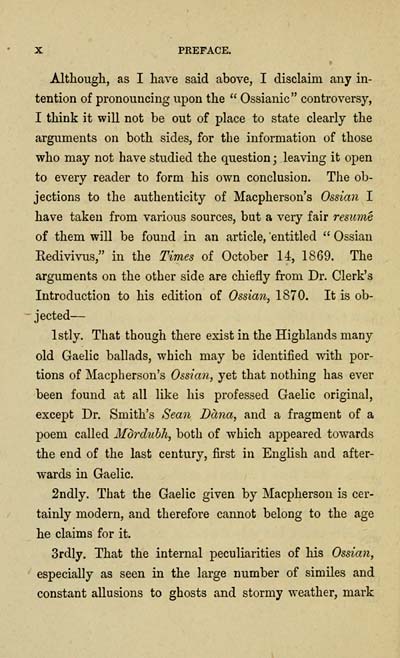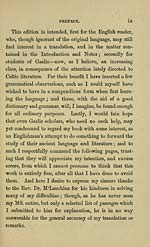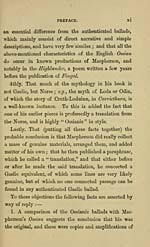Download files
Complete book:
Individual page:
Thumbnail gallery: Grid view | List view

Although, as I have said above, I disclaim any in-
tention of pronouncing npon the " Ossianic" controversy,
I tliink it will not be out of place to state clearly tlie
arguments on both sides, for the information of those
who may not have studied the question ; leaving it open
to every reader to form his own conclusion. The ob-
jections to the authenticity of Macpherson's Ossian I
have taken from various sources, but a very fair resumè
of them will be found in an article, 'entitled " Ossian
Redivivus," in the Times of October 14, 1869. The
arguments on the other side are chiefly from Dr. Clerk's
Intrcduction to his edition of Ossian, 1870. It is ob-
jected —
Istly. That though there exist in the Highlands many
old Gaelic ballads, which may be identified with por-
tions of Macpherson's Ossian, yet that nothing has ever
been found at all like his professed Gaelic original,
except Dr. Smith's Seaìi Dàna, and a fragment of a
poem called Mòrduhh, both of which appeared towards
the end of the last century, first in English and after-
wards in Gaelic.
2ndly. Tbat the Gaelic given by Macpherson is cer-
tainly modern, and therefore cannot belong to the age
he claims for it.
3rdly. That the internal peculiarities of his Ossian,
especially as seen in the large number of similes and
constant allusions to ghosts and stormy weather, mark
tention of pronouncing npon the " Ossianic" controversy,
I tliink it will not be out of place to state clearly tlie
arguments on both sides, for the information of those
who may not have studied the question ; leaving it open
to every reader to form his own conclusion. The ob-
jections to the authenticity of Macpherson's Ossian I
have taken from various sources, but a very fair resumè
of them will be found in an article, 'entitled " Ossian
Redivivus," in the Times of October 14, 1869. The
arguments on the other side are chiefly from Dr. Clerk's
Intrcduction to his edition of Ossian, 1870. It is ob-
jected —
Istly. That though there exist in the Highlands many
old Gaelic ballads, which may be identified with por-
tions of Macpherson's Ossian, yet that nothing has ever
been found at all like his professed Gaelic original,
except Dr. Smith's Seaìi Dàna, and a fragment of a
poem called Mòrduhh, both of which appeared towards
the end of the last century, first in English and after-
wards in Gaelic.
2ndly. Tbat the Gaelic given by Macpherson is cer-
tainly modern, and therefore cannot belong to the age
he claims for it.
3rdly. That the internal peculiarities of his Ossian,
especially as seen in the large number of similes and
constant allusions to ghosts and stormy weather, mark
Set display mode to: Large image | Transcription
Images and transcriptions on this page, including medium image downloads, may be used under the Creative Commons Attribution 4.0 International Licence unless otherwise stated. ![]()
| Early Gaelic Book Collections > J. F. Campbell Collection > Dàn an Deirg agus Tiomna Ghuill (Dargo and Gaul) > (24) |
|---|
| Permanent URL | https://digital.nls.uk/77287922 |
|---|
| Description | Volumes from a collection of 610 books rich in Highland folklore, Ossianic literature and other Celtic subjects. Many of the books annotated by John Francis Campbell of Islay, who assembled the collection. |
|---|
| Description | Selected items from five 'Special and Named Printed Collections'. Includes books in Gaelic and other Celtic languages, works about the Gaels, their languages, literature, culture and history. |
|---|

